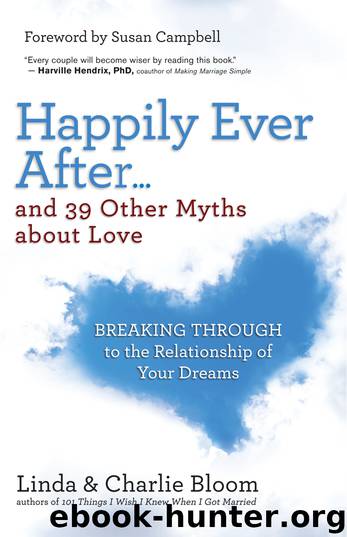Happily Ever After...and 39 Other Myths about Love by Linda Bloom

Author:Linda Bloom
Language: eng
Format: epub
Publisher: New World Library
Myth 20
You can be right and have a good relationship.
The key word in this myth is and. While many of us may claim to believe that the need to be right and a good relationship do not go together, we act as if the opposite were true. While we claim to recognize the danger in insisting that our view is always the correct one, we nonetheless act as though we can get away with indulging our desire to be right without jeopardizing our relationship. When we truly recognize that being right and having fulfilling relationships are mutually exclusive, the impulse to attempt to coerce our partner into seeing things our way diminishes and the desire to understand the other’s perspective becomes more dominant.
Wanting to be right is a form of defensiveness. Resisting the impulse to act defensively is easier said than done. All types of defensiveness have to do with implementing different types of control. Defensive reactions include (but are not limited to) withdrawal, blaming, interrupting, counterattacking, guilt-tripping, justifying, explaining, invalidating, intimidating, rationalizing, pleading, and cajoling. Trying to be right is a strategy to invalidate another’s perspective in order to have our own point of view define the “reality” of the situation. When we feel provoked or criticized, particularly by someone with whom we have an intimate relationship, this impulse to be right or act defensively can be strong. It may seem out of proportion to the situation. This can happen when someone’s words or behavior activate our unhealed emotional wounds. When our “hot buttons” are triggered, we can be possessed by emotions that we usually keep beneath our conscious awareness through a range of protective mechanisms. Unfortunately, we pay a price for keeping these feelings outside of our awareness.
Our resistance to experiencing unwanted feelings diminishes the quality of our relationships and inhibits our capacity to experience intimacy. It blocks our creative energy and causes us to live with pervasive low-level anxiety. Contrary to popular advice, it’s usually not possible to simply “let go” of the past. Until we identify the roots of our defensive patterns, we continue to be enslaved by them. The best way to recognize what we need to see, but have been avoiding, is by being in a close relationship. Committed partnerships by their very nature activate our deepest longings, strongest desires, greatest fears, and most intense emotions, primarily because we pin our greatest hopes on these chosen partnerships. Consequently, when we feel disappointed by our partner, the pain can be overwhelming. One of the ways in which we may attempt to avoid or mitigate this pain is by trying to control our partner’s behavior. Being right is one way of trying to fulfill that intention.
Freeing ourselves from the need to be right and from the grip of defensiveness is not so much about changing our behavior as changing our perspective of a given situation. Differences in perspective are inevitable in all relationships, and they are valuable. They remind us that there are other ways of viewing things.
Download
This site does not store any files on its server. We only index and link to content provided by other sites. Please contact the content providers to delete copyright contents if any and email us, we'll remove relevant links or contents immediately.
Doing It: Let's Talk About Sex... by Hannah Witton(8559)
The 5 Love Languages: The Secret to Love That Lasts by Gary Chapman(8524)
Should I Stay or Should I Go? by Ramani Durvasula(6797)
The Road Less Traveled by M. Scott Peck(6646)
The Lost Art of Listening by Michael P. Nichols(6481)
Daring Greatly by Brene Brown(5649)
We Need to Talk by Celeste Headlee(4879)
Beartown by Fredrik Backman(4433)
Men In Love by Nancy Friday(4339)
The State of Affairs by Esther Perel(3943)
The Rules Do Not Apply by Ariel Levy(3913)
How To Win Friends and Influence People by Dale Carnegie(3778)
Reflections Of A Man by Mr. Amari Soul(3707)
The Ethical Slut by Janet W. Hardy(3509)
Algedonic by r.h. Sin(3507)
Pillow Thoughts by Courtney Peppernell(3412)
Finding My Forever by Heidi McLaughlin(3311)
He's Just Not That Into You by Greg Behrendt & Liz Tuccillo(3308)
I Love You But I Don't Trust You by Mira Kirshenbaum(3234)
